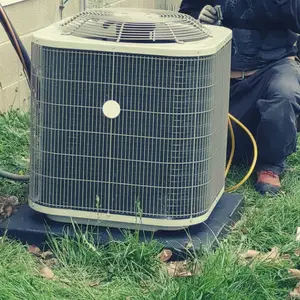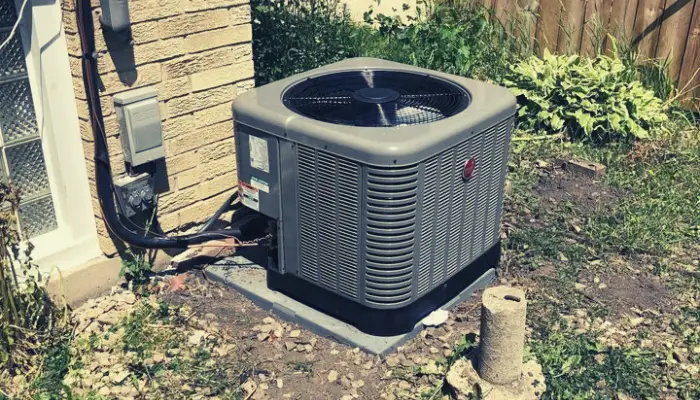A broken air conditioning system is uncomfortable at best, and dangerous at worst. After all, a hot summer day is not the same in Arizona as in Washington. If your AC system recently broke, you may be wondering how long you must put up with the heat.
Your landlord can leave you without air conditioning for 48 hours to 30 days. The specific time depends on where you live because regions have varying habitability laws. Habitability laws dictate what is considered an essential service and what is considered an amenity.
In Nevada, AC is considered an essential service. This means a landlord in Nevada is required by law to repair the system within 48 hours. In California, AC is considered an amenity, so a landlord in California is required to repair the system in 30 days.
Be sure to review your local habitability laws before taking legal action. These laws may differ depending on the city and county you live in, not just the state.

Table of Contents
Air conditioning laws in different regions
In your region, air conditioning may or may not be considered essential for habitable living. Habitable living refers to living conditions that are safe and healthy.
For example, air conditioning is an essential right in Nevada because of the extreme heat. If your AC is broken in Nevada, the landlord must fix the system within 48 hours. Other essential services include running water and electricity.
California law does not list AC systems as essential; air conditioning is an amenable service. If you live in California and your AC is broken, your landlord has 30 days to make the repair. Other amenities include dishwashers, and in-unit washers and dryers.
Regardless of where you live, if you are a renter, your landlord is expected to uphold their side of the lease agreement, which includes repairing essential systems and amenities that were available at the signing of the lease agreement. This may include essential systems such as heaters, and amenities such as dishwashers.
What to do when your air conditioning (AC) is broken in your apartment
When your air conditioning system is broken, you will need to take action to repair it. The following steps may be helpful for addressing the issue. If submitting a maintenance request is not enough, consider withholding rent or hiring someone to fix it.
- Request that the AC be fixed
- Withhold rent until the AC is fixed
- Fix the AC and lower rent amount by the money spent
- Break the lease
- Take legal action
The steps listed above may also apply to other services or features included in your lease agreement. Air conditioning is one example of an amenity or essential service, like a heater or running water. You may want to use the following as a general guide to getting repairs done in your apartment!
1. Request that the air conditioning system be fixed
This is the simplest step, and it may be all that you need to resolve your situation. Be sure to make your maintenance request in writing of some form. Submitting a maintenance request is not always enough. To ensure the best result, consider emailing your landlord or mailing a letter. It is wise to have a paper trail available for the future.
If you have not done so already, review the habitability laws in your area. These regulations will state your rights as a tenant and clarify how long your landlord has to resolve the issue. As described above, the wait time can be anywhere from 48 hours to 30 days. That’s a huge difference! Don’t wait longer than necessary.
2. Withhold rent until the AC is fixed
If AC is included in your lease agreement and your landlord has not repaired the system after the allowed time, you have a legal right to withhold rent until it is fixed. For minimal issues, familiarize yourself with the regulations in your region. The best course of action is legal, in the long term!
The amount you withhold should be proportional to the inconvenience caused by the broken AC. You can make an estimate based on the climate, time spent at home, and time spent using air conditioning. For example, if you work from home and are in the height of summer, you may reasonably withhold a larger portion of the rent amount than if you commute to work and it is wintertime.
3. Fix the AC and lower rent amount by the money spent
Sometimes submitting a request is not enough. If you have taken action to get your AC system repaired but your landlord does not comply with habitability laws, take advantage of your tenant rights. If your landlord has not fixed the issue in a reasonable time frame, you have the right to repair the damages and deduct the cost from your rent.
If you are hands-on and a fast learner, you may want to fix the AC yourself and lower your rent amount by the time and labor spent working on the issue. Otherwise, you can hire someone to fix the unit, and subtract your rent due by the full cost of the service.
3. Break the lease
Tenants break a lease when they terminate their stay in a unit before the agreed upon time frame. For example, you may have moved into your apartment and signed a contract stating that you would pay $2,000 a month for one year. If you move out before the year is up, or fail to pay the $24,000 in rent, the lease has been broken. There is usually a large cost associated with breaking a lease early. However, breaking a lease is legal and appropriate in some cases.
To be sure about your tenant rights, clarify what conditions must be met for you to break your lease legally. If your landlord does not comply with local codes and your unit is uninhabitable according to your region’s regulations, you have a right to break your lease. When one party fails to uphold their responsibilities as listed in the contract, the contract has been breached. By this logic, the landlord violated the contract before the tenant broke their lease agreement.
4. Take legal action
Another option is to take legal action against your landlord. For success with this approach, you must record everything relevant to your case. If your air conditioning system is broken, take pictures that clearly show the issue, if it is visible. If this is not possible, perhaps you can record the effects of the broken AC. For instance, the broken AC likely leads to higher temperatures in your home. You can purchase an indoor thermometer, take a picture of the reading, and even consider this monetary cost when building your case.
For more guidance on filing a lawsuit, consult legal advisors to determine your next steps. The law can be tricky, especially as it changes according to your location. Regardless of the specific steps needed to take legal action, you can be sure that having a robust record of the issue will be helpful throughout the process.

How to cool down your apartment without AC
Perhaps you have already filed a maintenance request for the air conditioning to be repaired. You have sent an email, mailed a letter, taken pictures, and even scheduled an appointment with an external repair company. This does not change the fact that your home is getting hotter by the moment. In this case, it’s time to do all that you can to lower the temperature in your home.
Review the following list of suggestions adapted from Reader’s Digest Canada for simple steps you may take to improve your situation:
- Close the blinds
- Set ceiling fans to rotate counter-clockwise
- Use large appliances at night
- Use a dehumidifier
- Open windows at night
- Don’t use incandescent lightbulbs
Other options that may be easier to control than your external environment are as follows:
- Consume cold foods and iced drinks (popsicles, iced tea, ice water, etc.)
- Wear light clothing
- Refrain from doing physical activity or raising your body temperature
- Take a dip in a pool or local stream!
Some suggestions may be more feasible than others. Use them as you please to improve your situation and wellbeing.
Know your rights
Tenants have a right to habitable spaces, as determined by local regulations. Regardless of where you live, you have the law on your side to help you make the best of your situation. If you take legal steps to make your space habitable, you are protected from negative consequences.
More importantly, having a positive attitude will help you get the best possible outcome in the end. By communicating your needs clearly with the appropriate people, you will find success. Give folks the benefit of the doubt, and they may surprise you.
As landlords, we always strived to make our tenants happy and if an AC was broken we would JUMP on it and get it taken care of as fast as possible, even if that meant us paying an emergency fee associated with getting an HVAC professional out to the property. I’m sure it cost us more money than it could have, but as very personable landlords, we wanted to have happy tenants and to maintain a good relationship with them.
If it’s clear that they do not have your interest in mind, take the steps you need to. Remember, much of this advice may apply to other issues that are considered amenities or essential services per your lease agreement. Stay cool!
